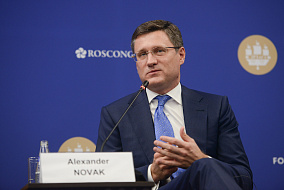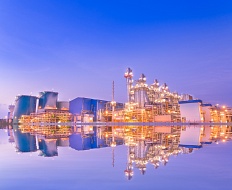Green Energy in the Arctic

KEY CONCLUSIONS
The role of the Arctic in the global economy is continuing to grow
“The Russian Arctic has become a key element in global supply chains. And as the transition to a carbon-neutral economy continues, so demand will increase for all the resources the Arctic possesses in abundance. These include rare-earth metals and liquefied natural gas. We can see that Gazprom, Novatek, and other companies are running production operations which are required during the energy transition to new forms of fuel, such as hydrogen, ammonia, and methanol. We are able to offer global transport solutions which will reduce mankind’s overall impact on the environment. Rosatom, for example, is planning to establish a link between Europe and Asia via the Northern Sea Route,” Nikolay Korchunov, Ambassador-at-Large of the Ministry of Foreign Affairs of the Russian Federation.
Investors are increasingly interested in green energy
“We are noticing a trend in industrial generation whereby investors are showing a responsible attitude towards the eco agenda and green initiatives. For example, there’s Novatek’s LNG project on the Yamal Peninsula, and the East Mining Company’s wind farm in Sakhalin Region with a capacity of almost 70 MW. And we will very soon be hearing about other projects. We are currently in discussions with investors regarding the forms of government support needed to achieve a several-fold increase in the number of green energy projects,” Vasiliy Potemkin, Managing Director, Far East and Arctic Development Corporation.
PROBLEMS
The high cost of green projects
“Currently, green projects are primarily aimed at supplying energy to small settlements. If we want to talk about the need to develop large-scale production, then new approaches will be required. Due to the vast distances involved in the Russian Arctic, many green technologies are impractical, because they will never pay off. Some projects may be interesting in Europe, but for us they are not economically viable,” Roman Berdnikov, First Deputy General Director, Member of the Management Board, RusHydro.
A lack of government support for green energy
“Why are no major projects in the Arctic based on renewable energy sources? Because there are no major consumers, or demand is only just starting to develop. In addition, there is either no essential grid infrastructure, or it exists in a very rudimentary form only. The Arctic has no essential initiatives in place to support renewable energy projects, which would otherwise make them interesting to investors and form part of the programme to achieve carbon neutrality in the region,” Vyacheslav Sinyugin, Deputy General Director for Digital Transformation and Energy Projects, Zarubezhneft.
SOLUTIONS
Encourage cooperation between Russia and Arctic Council nations on green initiatives
“Together with its partners in the Arctic Council, Russia could achieve a great deal in terms of integrating our technology and approaches. One striking example is the Snezhinka [Snowflake – ed.] research station, which will operate on renewable energy sources. The project is set to be implemented in the Yamalo-Nenets Autonomous District and Murmansk Region,” Nikolay Korchunov, Ambassador-at-Large of the Ministry of Foreign Affairs of the Russian Federation.
Facilitate the sharing of best practices pertaining to green energy among international companies
“It is crucial for companies to share best practices pertaining to green energy in the Arctic. I would like to propose that the Far East Development Corporation serves as a platform to facilitate this sharing of experience,” Vyacheslav Sinyugin, Deputy General Director for Digital Transformation and Energy Projects, Zarubezhneft.
Implementing hybrid energy projects in the Russian Arctic
“RusHydro is constructing a number of diesel/solar hybrid generators as per a set of new energy service contracts. By 2024, 72 settlements in Yakutia and 7 in Kamchatka will have generators installed. This will help in efforts to upgrade the energy system, freeze energy tariffs, and reduce deliveries of diesel fuel by 30%,” Roman Berdnikov, First Deputy General Director, Member of the Management Board, RusHydro.
“Supplying energy to settlements in the Arctic is an important matter. The current diesel and coal generation infrastructure requires modernization. Can it be quickly replaced by renewable energy sources across thousands of settlements? Even replacing outdated equipment with new diesel generators will lead to a 20–30% reduction in emissions. The next stage is installing hybrid generators which use renewable energy sources,” Vasiliy Potemkin, Managing Director, Far East and Arctic Development Corporation.
For more information, visit the Roscongress Foundation’s Information and Analytical System at roscongress.org/en.





